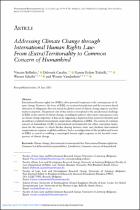| dc.contributor.author | Bellinkx, Vincent | |
| dc.contributor.author | Casalin, Deborah | |
| dc.contributor.author | Scholtz, Werner | |
| dc.date.accessioned | 2022-09-09T11:42:27Z | |
| dc.date.available | 2022-09-09T11:42:27Z | |
| dc.date.issued | 2022 | |
| dc.identifier.citation | Bellinkx, V. et al. (2022). Addressing climate change through international human rights law: From (extra) territoriality to common concern of humankind. Transnational Environmental Law 11(1), pp. 69-93. https://doi.org/10.1017/S204710252100011X | en_US |
| dc.identifier.issn | 2047-1033 | |
| dc.identifier.uri | https://doi.org/10.1017/S204710252100011X | |
| dc.identifier.uri | http://hdl.handle.net/10566/7844 | |
| dc.description.abstract | International human rights law (IHRL) offers potential responses to the consequences of climate
change. However, the focus of IHRL on territorial jurisdiction and the causation-based
allocation of obligations does not match the global nature of climate change impacts and their
indirect causation. The primary aim of this article is to respond to the jurisdictional challenge
of IHRL in the context of climate change, including its indirect, slow-onset consequences such
as climate change migration. It does so by suggesting a departure from(extra)territoriality and
an embrace of global international cooperation obligations in IHRL. | en_US |
| dc.language.iso | en | en_US |
| dc.publisher | Cambridge University Press | en_US |
| dc.subject | International human rights law | en_US |
| dc.subject | Climate change | en_US |
| dc.subject | International environmental law | en_US |
| dc.subject | Jurisdiction | en_US |
| dc.subject | Human rights | en_US |
| dc.title | Addressing climate change through international human rights law: From (extra) territoriality to common concern of humankind | en_US |
| dc.type | Article | en_US |

